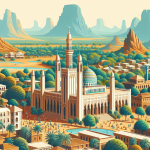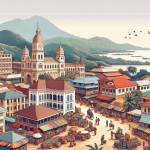Exploring the Wonders of Benin: Africa’s Hidden Gem
Benin, often overshadowed by its larger and more well-known neighbors in West Africa, is a country brimming with rich history, vibrant culture, and stunning natural beauty. While it may not be the first destination that comes to mind when planning an African adventure, this small nation offers a treasure trove of experiences for the intrepid traveler. From its ancient kingdoms and historic sites to bustling markets and pristine beaches, Benin is a destination that promises to captivate and enchant. In this comprehensive guide, we’ll delve into the many facets of Benin, exploring its top attractions, unique cultural heritage, and practical travel tips to help you make the most of your visit. Whether you’re a history buff, nature lover, or simply seeking an off-the-beaten-path adventure, Benin has something for everyone. So pack your bags and get ready to discover the wonders of this hidden gem.
The Rich History of Benin
One of the most compelling reasons to visit Benin is its fascinating history. The region is home to the ancient Kingdom of Dahomey, which thrived from the 17th to the 19th century. The kingdom was known for its powerful military, intricate artwork, and unique cultural practices. Today, visitors can explore the remnants of this once-great civilization in the city of Abomey, which was the capital of the Kingdom of Dahomey. The Royal Palaces of Abomey, a UNESCO World Heritage site, offer a glimpse into the grandeur and complexity of Dahomey society. The palaces are adorned with bas-reliefs and murals that depict historical events, religious ceremonies, and royal decrees. The on-site museum houses a collection of artifacts, including ceremonial objects, weapons, and regalia, providing valuable insights into the kingdom’s history and culture.
The Rise and Fall of the Dahomey Kingdom
The Kingdom of Dahomey was founded in the early 1600s and quickly rose to prominence due to its strategic location and military prowess. The kingdom’s rulers, known as the Fon, were able to consolidate power by forming alliances and engaging in warfare with neighboring states. One of the most distinctive features of the Dahomey military was the presence of the Amazons, an all-female regiment that was renowned for its bravery and combat skills. The kingdom’s wealth was largely derived from the slave trade, which was a significant aspect of the economy. However, the decline of the Atlantic slave trade in the 19th century, coupled with increased pressure from European colonial powers, led to the eventual downfall of the Dahomey Kingdom. In 1894, the French colonized the region, incorporating it into their West African territories.
Vibrant Culture and Traditions
Benin’s cultural heritage is a rich tapestry woven from various ethnic groups, each with its unique traditions, languages, and customs. The country’s diverse population includes the Fon, Yoruba, Bariba, and many other ethnic groups, all of which contribute to the vibrant cultural landscape. One of the most prominent aspects of Benin’s culture is its traditional religion, Vodun (Voodoo). Vodun is a complex belief system that involves the worship of deities, spirits, and ancestors. It plays a central role in the lives of many Beninese people, influencing their daily activities, social structures, and artistic expressions. Visitors can witness Vodun ceremonies and rituals, which often involve drumming, dancing, and elaborate costumes. The annual Vodun Festival, held in the coastal town of Ouidah, is a particularly spectacular event that attracts participants and spectators from around the world.
Traditional Art and Crafts
Benin is also renowned for its traditional art and crafts, which reflect the country’s rich cultural heritage. The craftsmanship of Beninese artisans is evident in a wide range of artistic expressions, including woodcarving, pottery, textiles, and metalwork. One of the most famous art forms is the bronze casting technique used by the Fon people to create intricate sculptures and plaques. These artworks often depict historical figures, mythological beings, and scenes from everyday life. The town of Port-Novo, the capital of Benin, is a hub for traditional crafts and offers numerous markets and workshops where visitors can purchase unique handmade items. Additionally, the National Museum of Benin in Port-Novo houses an impressive collection of artifacts that showcase the country’s artistic achievements and cultural history.
Natural Wonders and Outdoor Adventures
In addition to its rich history and vibrant culture, Benin boasts a diverse array of natural landscapes and outdoor activities. From lush forests and wildlife reserves to pristine beaches and tranquil lagoons, the country’s natural beauty is sure to impress. One of the top destinations for nature lovers is Pendjari National Park, located in the northern part of Benin. This UNESCO World Heritage site is one of the last remaining strongholds for West African wildlife, offering visitors the chance to see elephants, lions, leopards, and a variety of bird species in their natural habitat. The park is also known for its stunning landscapes, which include savannahs, mountains, and rivers.
Exploring Pendjari National Park
Pendjari National Park is a must-visit destination for anyone interested in wildlife and nature. The park covers an area of approximately 4,800 square kilometers and is part of the larger W-Arly-Pendjari (WAP) complex, which spans Benin, Burkina Faso, and Niger. Visitors can embark on guided safaris to explore the park’s diverse ecosystems and observe its abundant wildlife. The best time to visit Pendjari is during the dry season, from November to April, when animals are more easily spotted around water sources. In addition to game drives, the park offers opportunities for birdwatching, hiking, and camping. Accommodations range from basic campsites to more comfortable lodges, providing options for all types of travelers.
Practical Travel Tips for Visiting Benin
Traveling to Benin requires some preparation and planning to ensure a smooth and enjoyable trip. Here are some practical tips to help you get started:
- Visa Requirements: Most visitors to Benin will need a visa to enter the country. It’s advisable to apply for a visa in advance through the Beninese embassy or consulate in your home country. Some nationalities may be eligible for a visa on arrival, so be sure to check the latest requirements before you travel.
- Health and Safety: It’s important to take health precautions when traveling to Benin. Make sure you have up-to-date vaccinations, including those for yellow fever, hepatitis A and B, typhoid, and malaria. It’s also a good idea to carry a basic medical kit and travel insurance that covers medical emergencies.
- Currency and Payments: The official currency of Benin is the West African CFA franc (XOF). It’s recommended to carry some cash, as credit cards may not be widely accepted outside major cities. ATMs are available in larger towns, but it’s advisable to have enough cash on hand for rural areas.
- Language: French is the official language of Benin, but many local languages, such as Fon and Yoruba, are also widely spoken. Learning a few basic phrases in French can be helpful for communication.
- Transportation: Getting around Benin can be an adventure in itself. Public transportation options include buses, minibusses, and motorcycle taxis (zemidjans). For longer distances, you may consider hiring a private car or using domestic flights.
By following these tips and being open to new experiences, you’ll be well-prepared to explore the wonders of Benin and create unforgettable memories.
Conclusion: Discovering Benin’s Unique Charm
In conclusion, Benin is a destination that offers a unique blend of history, culture, and natural beauty. From the ancient Kingdom of Dahomey and its royal palaces to the vibrant traditions of Vodun and the stunning landscapes of Pendjari National Park, there’s something for every traveler to enjoy. While it may not be as well-known as other African destinations, Benin’s hidden gems and off-the-beaten-path experiences make it a truly special place to visit. So, whether you’re exploring the bustling markets of Cotonou, attending a Vodun festival in Ouidah, or embarking on a safari in Pendjari, you’ll find that Benin is a country that captivates the heart and soul. Don’t miss the opportunity to discover this remarkable destination and experience all that it has to offer.
For more information on planning your trip to Benin, you can visit the official tourism website of Benin [here](https://www.benintourism.com).








